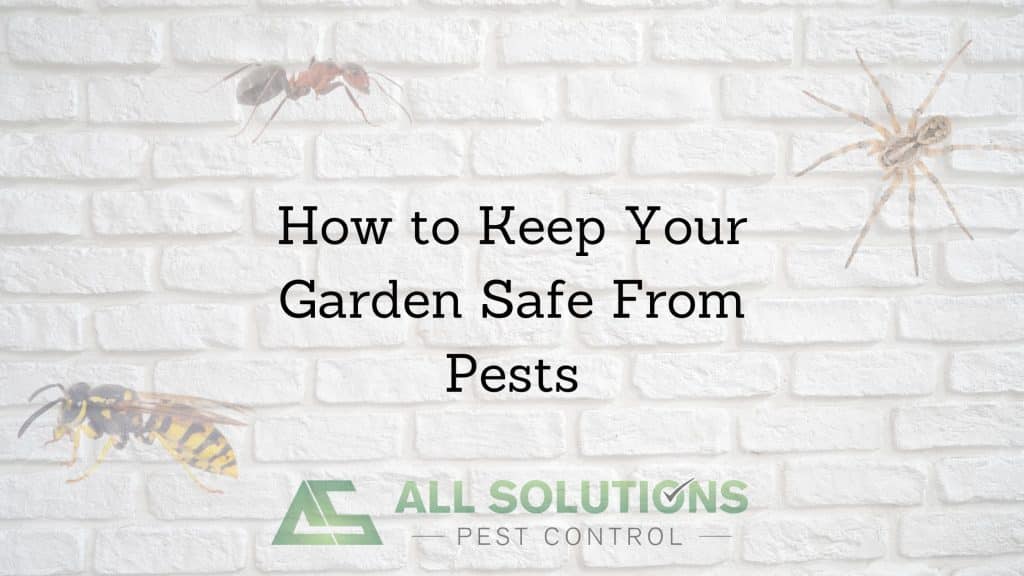How to Keep Your Garden Safe From Pests-Because having a beautiful garden is a dream for many homeowners, pesky pests can quickly turn that dream into a nightmare. Dealing with garden pests can be frustrating, but with the right knowledge and preventive measures, you can create a pest-free paradise in your backyard. So, in this article, we will explore effective strategies to keep your garden safe from pests, ensuring the health and vibrancy of your plants. Read on to discover some essential tips and tricks that will help you maintain a pest-free garden throughout the year.
Identify Common Garden Pests
The first step in pest control is identifying the culprits. Familiarize yourself with the most common garden pests such as aphids, slugs, snails, caterpillars, and beetles. Different pests require different approaches, so being able to recognize them will enable you to choose the most effective treatment methods.
Practice Good Garden Hygiene
Maintaining good garden hygiene is crucial in preventing pest infestations. Remove any dead leaves, decaying plants, or fallen fruits regularly, as these can attract pests. Weeds should also be promptly removed, as they provide shelter and food sources for many insects. By keeping your garden clean and tidy, you reduce the chances of pests taking up residence.
Implement Companion Planting
Companion planting involves strategically placing certain plants together to naturally repel pests. For example, planting marigolds can deter aphids, while basil repels mosquitoes and flies. Research different plant combinations and incorporate them into your garden to create a natural barrier against pests.
Utilize Natural Pest Control Methods
Instead of resorting to harsh chemicals, opt for natural pest control methods that are safe for your garden and the environment. For instance, introducing beneficial insects like ladybugs and lacewings can help control aphids and other harmful pests. Additionally, using organic insecticidal soaps and neem oil can effectively eliminate pests while minimizing harm to beneficial insects.
Erect Physical Barriers
Protecting your garden with physical barriers is an effective way to prevent pests from accessing your plants. Install fences or netting around your garden to deter larger pests like rabbits and deer. Covering vulnerable plants with row covers can safeguard them from flying insects and other pests.
Encourage Natural Predators
Attracting natural predators to your garden is an organic and sustainable method of pest control. Birds, frogs, toads, and bats feed on a variety of garden pests. Create habitats such as birdhouses, birdbaths, and ponds to invite these helpful creatures into your garden.
Practice Crop Rotation
Crop rotation is a preventive technique that involves changing the location of crops from season to season. By rotating your crops, you disrupt the life cycle of pests and reduce the risk of infestations. This method also helps maintain soil health and nutrient balance, promoting the overall well-being of your garden.
Water and Fertilize Properly
Proper watering and fertilization are crucial for plant health and resilience against pests. Overwatering can create moist conditions that attract pests, while underwatering weakens plants, making them more susceptible to infestations. Similarly, excessive fertilization can cause excessive plant growth, which can attract pests. Follow recommended watering schedules and fertilize your plants according to their specific needs.
Regular Inspection
Frequent inspections of your garden allow you to catch pest problems early on. Check the undersides of leaves, stems, and soil for signs of pest activity. Look for holes, bite marks, discoloration, and wilting as indications of potential infestations. The earlier you detect pests, the easier it is to manage and minimize the damage they can cause.
Seek Professional Assistance
So, if you’re facing persistent or severe pest problems, don’t hesitate to seek professional assistance. Pest control experts have the knowledge, experience, and tools to effectively manage even the most stubborn infestations. They can assess your garden, identify the specific pest issues, and provide targeted solutions tailored to your needs.
With these essential tips, you can create a safe and pest-free haven in your garden. By identifying common garden pests, practicing good hygiene, implementing natural pest control methods, and adopting preventive measures, you can keep your plants healthy and vibrant all year round. Remember, early detection and regular maintenance are key to successfully combating pests. If you need expert assistance, don’t hesitate to reach out to us at All Solutions Pest Control to help safeguard your garden.
Additionally, our pest control experts can provide personalized advice and recommendations based on the specific needs of your garden. Whether you’re dealing with a particular pest infestation or simply want to establish preventive measures, our team is equipped to handle it all. Don’t let pests ruin the beauty and tranquility of your garden any longer.
Contact our professional pest control company today at 636-486-7888 and take the first step toward a pest-free garden. Let us help you protect your plants, maintain a healthy environment, and enjoy the natural splendor of your garden without the nuisance of pests. Your dream garden is just a phone call away!
